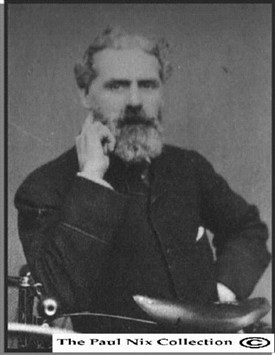Thomas Humber and his early years in Nottingham

Thomas Humber
The Paul Nix Collection
By Joseph Earp
Thomas Humber was born on 16th October 1841. From the time Humber founded his factory at Beeston in 1869 to the time the company was sold in 1896, Humber established himself as the first maker of series production cars in England.
The young Thomas moved to Nottingham from Yorkshire in 1849 with his parents Samuel Humber and his wife Lucy, nee Turton. Thomas was to experience Nottingham’s Industrial life very young and was taken into the employ of a Mr Cross of Mortimer Street, Nottingham. He was not formerly apprenticed to Mr Cross’s trade of wheelwright and blacksmith but ‘picked it up’ well enough for his workmates and his foreman to notice his skill at forging parts for lace-making machinery.
After a year with Cross, Humber moved to join Bitterly Iron Co, and here, his exceptional skills and talent came to be noticed. Despite his success and the entreaties of his employer for him to stay, Humber wanted to broaden his experience and knowledge. The following years found him moving from employer to employer and learning his trade.
Prior to setting up on his own business, Humber was employed as ‘chief-blacksmith’ in the factory of William Campion on Roden Street in Nottingham. It was while working for Campion that Humber was inspired to go into bicycle making. In 1867, Campion visited Paris to exhibit the line of chain-stitch domestic sewing machines his company manufactured. While in Paris Campion saw and purchased a French velocipedes of Michaux type. This, he brought back to Nottingham and asked Thomas Humber to make six sets of copy forgings. At this date, the system where the pedals acted directly on the front wheel was a break through. Humber, however, was to improve this design and in 1868 created a safety bicycle whereby the pedals drove the rear wheel.
Humber now set up in business for himself, producing bicycles in a shed at the back of his house on Northumberland St. in Nottingham. Such was the high demand for Humber’s break through design he was forced to move to bigger premises on Stretton St, Nottingham. Here, Humber produced his ‘Spider Bicycle’ an early form of the ‘ordinary bicycle’ (penny farthing).
By the 1870’s Humber formed partnership with Frederick Cooper and Thomas Rushworth Marriott. The triumvirate proved to be a powerful combination with Humber continuing to devote his attention to design and production.
The now famous Humber works in Beeston was built in 1880. By 1892 Thomas Humber was employing 1200 people and when he branched into motor car production this rose to 1800. By this time the businesses were locating to other factories outside of Nottingham in Wolverhampton and Coventry. The Beeston Factory products however were synonymous with the highest quality.
By the time Humber died in 1910 of Cancer his work and legacy were revolutionary in influencing future motor and cycle companies. Even though Humber was not born in Nottingham it is his early working career in Nottingham industries that influenced the great man. From early years of small production in his shed at the bottom of his garden to becoming one of the largest motor and bicycle firms in Britain.
Article written by Joe Earp and Iris Tansley
The New Nottingham Hidden History Team